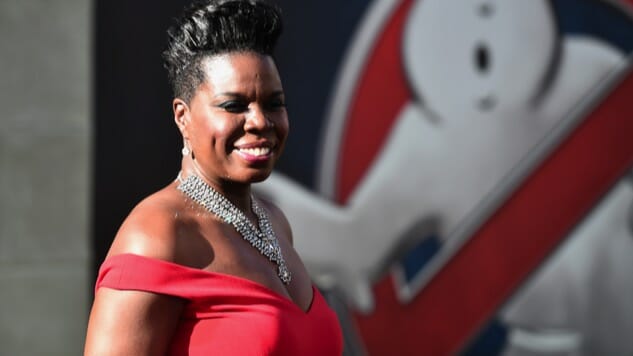On Leslie Jones and the Criminality of Carefree Black Girls

Photo Credit: Getty
Does my sassiness upset you?
Why are you beset with gloom?
‘Cause I walk like I’ve got oil wells
pumping in my living room.
I’ve said before that there are real dangers in reading, especially in reading poetry, which is perhaps one of the only places where I see the possibility of true freedom for black people who live in America. Literature is also this very dangerous place where black people—women especially—are allowed a certain freedom that they can’t quite experience anywhere else. Toni Morrison’s Sula, Zora Neale Hurston’s Janie, Alice Walker’s Nettie; yes, their stories are complicated but they all managed, at some point or another, to escape a certain criminalizing of carefree black womanhood. Witnessing such harrowing escapes get the imagination going, and it’s probably dangerous to imagine a place where black girls and women get to be some version of their authentic selves—selves who do not always pledge allegiance, or selves who wear American flag swimsuits on Twitter, or selves who have the audacity to attend music festivals, or selves who desire to protect themselves against the American police state. It’s probably not safe for me to get my hopes up about a world where the term “carefree black girls” is no longer even necessary, because black girlhood and womanhood won’t be so closely associated with struggle and sacrifice. I’ve never even used the term publicly myself, until today when I realized that it’s a concept that scares people so much, they’ll go to great lengths to cut it down.
Today, Leslie Jones is trending on Twitter for the same reason she quit Twitter not too long ago—she is under attack. I believe she is under attack because she has continuously broken the rules about how you’re supposed to publicly be black and woman in 2016. What I’m learning this year is that people like a calm black woman and a gracious black woman. I’ve written about how an image of a black woman standing in front of the Baton Rouge police went viral in part because we champion those black women who—against all odds—maintain their composure. Not a hair out of place, even in the midst of men licensed to kill. We love a Coretta Scott King, we love a Michelle Obama, we love black women praying in Church. Of course that “love” is completely contradicted by the society and politics we embrace, where black women praying are no safer than black women twerking in Beyoncé videos, black girls watching their fathers murdered in real time, or black women comedians covering the 2016 Olympics. But there’s certainly a difference in who we proclaim “innocent” when the time comes to defend black women against attacks.
When Leslie Jones was invited to Rio to cover the Olympics, I rejoiced not so much as a fan of her work on Saturday Night Live, but as a fan of that greater image I know she represents, whether she asked to represent it or not. Jones is one of a handful of dark-skinned black women (important to note, because colorism is very much a thing), who is also not a size 0-4, making waves in Hollywood. She is, in so many ways, everything many black women are taught from a very young age is not okay—she’s loud, she’s both bodacious and self-deprecating and she’s unapologetic about the space she takes up.
-

-

-

-

-

-

-

-

-

-

-

-

-

-

-

-

-

-

-

-

-

-

-

-

-

-

-

-

-

-

-

-

-

-

-

-

-

-

-

-








































